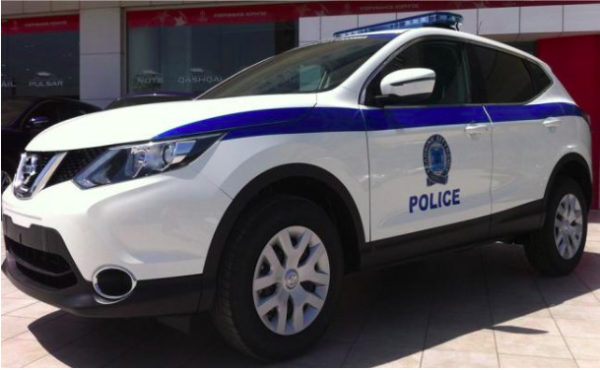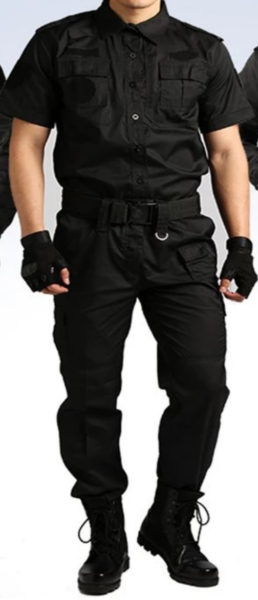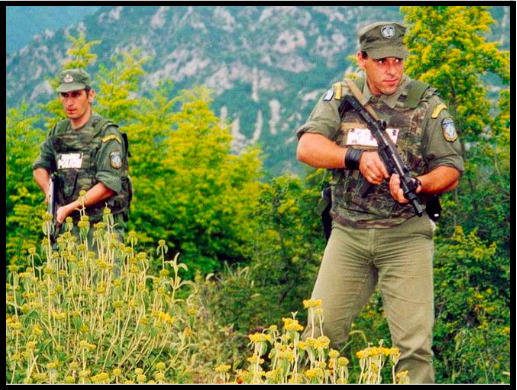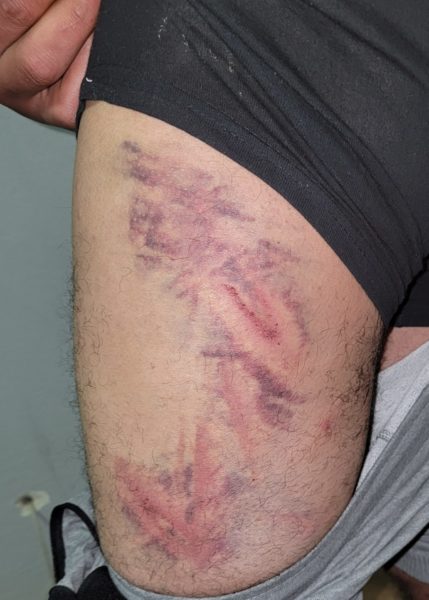The respondent, a 24-year-old male from Morocco, recounts the second pushback he has experienced from Greece, which took place on 05/05/2022.
The respondent reported that on Sunday 01/05/2022, 9pm the respondent, along with two other Moroccan males, set out on foot from Edirne to the Greek border. The group’s ages ranged from 24-32. Reportedly, the group arrived at 11pm, at a 5-meter barbed border fence near Karaağaç and crossed around 11:15pm. After crossing the fence, as described by the respondent, the group quickly started running across muddy farmland until they got to a dry river area nearby.
The respondent stated that they walked for four days and nights through forested areas between mountains but rested at sunrise. In the early morning of 05/05/2022, the group arrived at a crossroads about 4km from Komotini. The respondent described that the group waited at a large four-lane road before continuing on to the mountains.
The respondent stated that at 8am, while the transit group was waiting to cross the road, they saw a white Nissan car with a red and blue siren and a blue strip with “police” written on the side (see image below) s driving on the opposite side of the road slowed down and parked. Then, as recalled by the respondent, the car started driving and turned in their direction and stopping just a few feet from them. The respondent was not able to recall the number plate of the vehicle.
The respondent stated that there were two uniformed men in the car, who stepped out and started speaking in Greek to the transit group. The respondent stated that these two men were dressed in marine-blue short-sleeved shirts and pants with ‘police’ written in English. According to the respondent, both uniformed men were carrying guns and black plastic batons in a holster. Reportedly, when the uniformed men realised that the group did not understand Greek, they asked them in English where they were from. The respondent stated that they said they were from Morocco and then they were told in English by the uniformed men to step to the side of the road.
The respondent stated that the images below matched the clothing and car he described.

The respondent stated that the group was made to wait at the side of the road for 30 minutes. During this time, the uniformed men did not address them, but spoke to each other and over walkie-talkie in Greek. The respondent stated that the group was not beaten, was not searched and they did not have anything taken from them during this time.
Then, reportedly, a large yellow Mercedes van arrived. The respondent did stated that the vehicle had no logos or identifying signs but he recognised that it had a Greek license plate.
The respondent stated that the van matched the vehicle in the image below, except that the colour was yellow.

According to the respondent, two men wearing balaclavas were driving this vehicle. As stated by the respondent, the two men stepped out from the vehicle and spoke to the other uniformed men in Greek; they did not speak to the transit group. Reportedly, the men wore black uniform shirts with short sleeves, black pants, black boots, and had they carried guns in their holsters.
The respondent described the uniforms as being similar to those in the image below.

Image 3: Plain black uniform
The respondent stated that they [transit group] was loaded into the trunk of the van and forced to sit on the ground. There was no one else in the van. The respondent described the trunk as 2 by 3 metres and said they were able to breathe properly but that they could not see outside and that the trunk was locked.
The respondent stated that the vehicle drove fast for one hour and twenty minutes non-stop to a detention site, where they were taken from the trunk of the vehicle. When they were taken out from the trunk, the respondent stated that he did not see any other vehicles. Reportedly, it was 09:30 am.
The respondent saw the detention site from the outside and the surrounding area. According to the respondent, the building had no official police or army signs. He described two single-story buildings attached to each other. One of the buildings, as stated by the respondent, had a flat roof and the other had an aluminum gabled roof “like a garage”. The respondent mentioned that there was a junkyard area with many old trailers and a rusty old truck. The wider area, according to the respondent, was farmland, with one building – “a farm” – far off in the distance. Later from the small window of the cell they were detained, the respondent stated that he could see the back of the site, which was surrounded by a 3m fence. From there he also saw a factory far off in the distance.
The respondent recalled seven uniformed men that were present at the detention site. The respondent stated that these seven uniformed men wore sage green pants and sage green shirts with the Greek flag on their right arm and the word ‘guard’ on the left arm above some words in Greek and had a plastic baton in their holster. None of these men were wearing balaclavas.
The respondent stated that the uniforms of these men matched those in the photo below.

The respondent described how the group was taken inside the building, being pulled by their shirts and hands with force. Inside, as reported, the transit group was made to stand in a line next to a wall. In addition to the seven men in the green uniforms, the respondent also noted that the drivers of the van were also still present. The respondent recalled that one of the drivers of the van came to him and was holding a knife and assaulted him while the other officers laughed:
“One of the van drivers came to me and told me in English, ‘you want to look like European, I will tell you how the European do.’ He asked his friend for knife and hold my hair, and when I said “please!” and I was screaming from the pain, he punched me twice in my stomach and held my hair and shaved it with that knife. They were laughing and kicked me with force on my stomach.”
The respondent stated that he was sure at this time that the assailant was going to stab him with the knife.
After this incident, the respondent described that the group were forced to undress completely. Their backpacks and clothing were taken and searched. As recalled by the respondent, the search was conducted by three of the men in the sage-green uniforms. The respondent stated that all of their belongings were searched and that everything was eventually taken — including telephones, money, their backpacks and shoes — except for a pair of pants and a shirt each. The respondent had €70, which was taken at this point.
The respondent stated that this went on for 30 minutes, throughout which they were forced to stand naked. According to the respondent, each person in the transit group was beaten with plastic batons, kicked and punched on various parts of their bodies. Reportedly, the uniformed men spoke to each other in Greek and to the transit group in English: “Few words: ‘turn’ and ‘shut up’ and ‘walk to there.’”

Image 6: The respondent’s thigh with bruises obtained through violent assaults
The respondent described after the beating they had been given back a pair of pants and shirt each and were then put into a cell. The respondent described the cell as being 7 x 5 meter big and walls made from aluminium and a door like a cage. As stated by the respondent, the floors were dirty and there was no toilet.
The respondent recalled that when his transit group was brought to the cell there were already around 60 other people detained. According to the respondent, the people were from Moroccan, Syrian, Palestinian, Afghan and Central African origin and estimated that their ages ranged from 10 to 55. Reportedly, there were two Syrian women and three minors with their families in the cells.
The respondent was detained for approximately seven or eight hours. During this time, as reported by the respondent, no one in the cell had access to a toilet, and people were not given any water or food. Reportedly, the people detained were not requested to present any documents, they did not have to sign anything, their fingerprints and photos were not taken and there was no translator present.
The respondent recalled that at approximately 5pm the entire group was taken from the cell by a group of six men in uniforms and balaclavas. The respondent stated that two of them were dressed in the same uniforms as those who had driven them to the detention site, and the other four were wearing black shirts and green camouflage pants. According to the respondent, none of their clothing had any insignia, armband or flag. The respondent stated that six men were armed with metal batons and tree branches, and the two dressed in black had guns in their holsters on their waist.
The respondent said that they were spoken to by only one person of the masked group, who spoke Arabic in a Syrian dialect: “He said, “Get out animals, hurry up.” The group, as described by the respondent, was taken outside and loaded into two white sprinter Mercedes vans. According to the respondent, neither of the vans had any flag or other official sign on the sides and both had Greek license plates. The respondent estimated in the van he was loaded into there were approximately 33 people. He also stated that three of the balaclava-wearing men joined the vehicle.
The respondent recalls that the van drove very fast for 10 minutes along unpaved roads. Although the back of the van did not had any windows, there were small holes on the side through which he could see unpaved road but also that dust was getting into the van.
The respondent stated that the vans arrived at the pushback site – a farmland area in Soufli/Lagyna close to the Evros/Meriç river with many trees around. The respondent noted that between the Greek side and the Turkish sides of the river there were some small islands. At the pushback site, the respondent saw that everyone in his cell was brought to this location.
In addition to the six men that had taken the group from the detention site to the pushback site, the respondent also saw four men wearing civilian clothes, with no logos or armbands identifying them. Reportedly, the four men in civilian clothes all spoke Arabic but with different dialects: the respondent estimated that some were Iraqi, some Syrian.
The respondent said that the Arabic-speaking men would sometimes speak to the uniformed men in Greek, but otherwise they only spoke to the detained group in Arabic to explain what the men in black told them.
The respondent described that the families in the group were ordered to stay in one separate group. Reportedly, everyone was ordered to give over everything they had hidden.The respondent stated that he was searched again and beaten with both a tree branch and a metal baton. At this point he was still just wearing his pants and a shirt.
The respondent said that after 20 minutes they were taken to a boat that was already in the river. The boat, as described by the respondent was a 3 x 1 metre inflatable rubber boat – blue on the outside and white on the inside. Reportedly, groups of eight people were ordered onto the boat, with two drivers from the group of civilian-clothed, arabic-speaking men. In terms of the entire pushback, the respondent stated that he was positioned in the middle.
The respondent recalls that the drivers of the boat used paddles to get across the river. The respondent stated they brought the groups to a small island in the middle of the river, including the women and minors. From there, as reported by the respondent, the groups were left to make their way across to the Turkish side. The respondent described the water level as slightly above waist-height. The groups attempted to walk back, “but some were taking wrong path and they had to swim.”
The respondent said that he got to the Turkish side before his friends, one of whom had been very badly beaten, and that he waited for them.
“One of them were beaten so hard and we barely could walk our leg. We were hungry and our feet hurt.”
The respondent described how they walked for one hour until they arrived to the village of Adasarhanlı. From there, they managed to get a taxi. The drive took one hour and thirty minutes. The respondent stated that at some point they got a problem with the taxi driver who threatened to call the police. The respondent did not further elaborate on this.
The respondent stated that he did not express his intention to claim asylum out of fear.
“I couldn’t, I was afraid and scared even to talk all the way. But in the apprehension, I talked to the officers who caught me and he ignored us, he didn’t even talk to us.”
